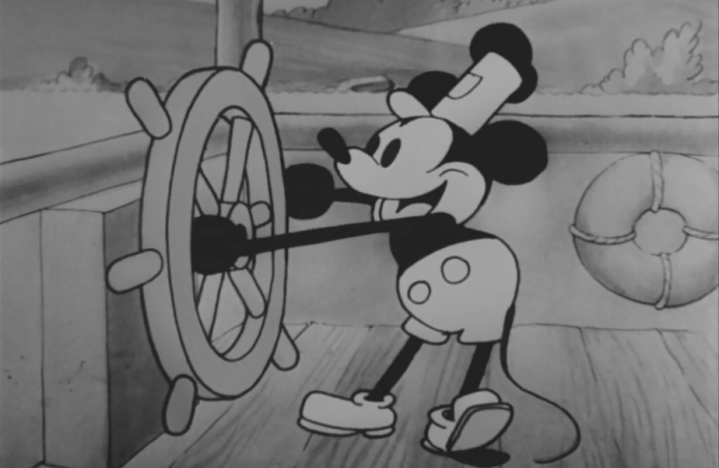
Why the earliest version of Mickey Mouse is entering the public domain
Share Now on:
Why the earliest version of Mickey Mouse is entering the public domain

Ninety-five years after making their debut, Mickey and Minnie have entered the U.S. public domain. That is, the earliest iterations of these characters as depicted in the 1928 shorts “Steamboat Willie” and “Plane Crazy.”
All other elements from these films have also entered the public domain, meaning you now have the ability to remix and adapt them in your own work however you want (with some exceptions).
“You don’t have to have Mickey tethered to a steering wheel. You could have him piloting a spaceship. You can have him breakdancing instead of doing that weird, jaunty move that he does in ‘Steamboat Willie.’ So you don’t have to hew to the plot of the original work,” said Jennifer Jenkins, the director of Duke University’s Center for the Study of the Public Domain, in an interview with Marketplace.
“Steamboat Willie” and “Plane Crazy” were supposed to enter the public domain in 2004, but Disney and other corporations lobbied for an extension to existing copyright law. That led Congress to enact the Copyright Term Extension Act of 1998, which gave these companies another 20 years of protection, on top of another extension that had already been granted to books, films and musical compositions in 1976. Next year, we’ll see works from 1929 entering the public domain.
Prior to this extension, work that was published between 1923 and 1977 was protected for 75 years. The cap is now 95 years.
There are some limitations to how you can use Mickey’s image, and it’s important to note the distinction between trademark and copyright law.
Trademark rights don’t automatically expire as copyrights do, Jenkins said, and trademark law is aimed at preventing consumers from getting confused about the source of a product or service.
You can’t put Mickey on your work if it will mislead people into thinking it was made by Disney, Jenkins wrote in a recent article. She noted that people who are using Mickey in their work can avoid confusion by including the source on the title screen or cover, along with “a prominent disclaimer indicating that your work was not produced, endorsed, licensed, or approved by Disney.”
Jenkins also wrote that Disney still has copyright over newer versions of Mickey, including the one from “The Sorcerer’s Apprentice” in the 1940 animated movie “Fantasia.” In this color version, Mickey is dressed as a magician in a red robe and a blue hat adorned with a crescent moon and stars.
But individual features that were added to these later versions may not be copyrightable, she said. For example, your version of Mickey “can speak intelligibly in a high voice” since you can’t copyright “a squeaky voice.”
Filmmakers have already started to take advantage of the new entrant into the public domain, as evidenced by the recently trailer for “Mickey’s Mouse Trap,” which features a serial killer dressed as the iconic rodent. Last year’s slasher film, “Winnie-the-Pooh: Blood and Honey,” premiered just a few weeks after the 1926 book it was based on went into the public domain.
Jenkins told Marketplace she hears people argue that these movies are a sign that the public domain is a terrible idea. But she pointed out that while these “buzzworthy remakes” will attract attention for their shock value, many beloved, artistic movies have been made thanks to the public domain. Including movies from Disney.
“This is not Disney’s downfall. This is an opportunity for them to maintain their incredible success while also dedicating a little something back to the public domain from which they’ve drawn so brilliantly,” Jenkins said.
There’s a lot happening in the world. Through it all, Marketplace is here for you.
You rely on Marketplace to break down the world’s events and tell you how it affects you in a fact-based, approachable way. We rely on your financial support to keep making that possible.
Your donation today powers the independent journalism that you rely on. For just $5/month, you can help sustain Marketplace so we can keep reporting on the things that matter to you.


















